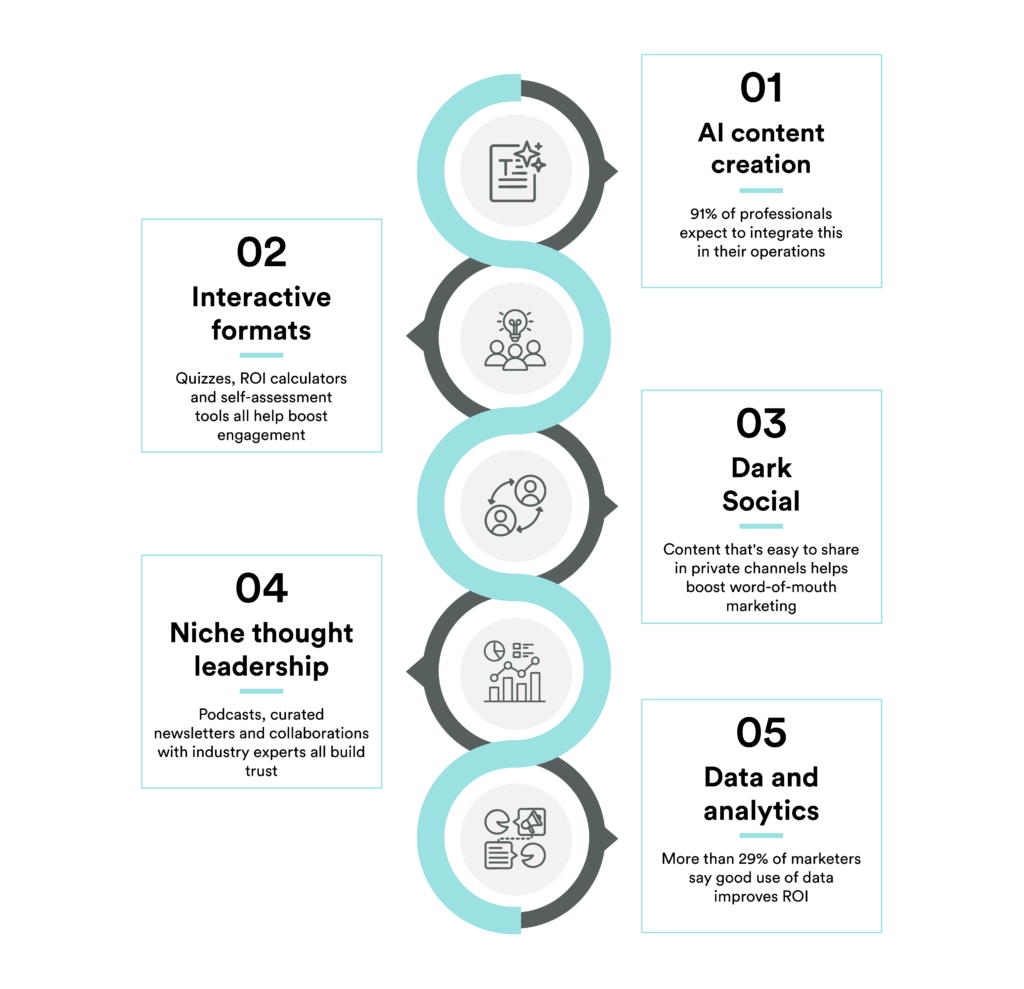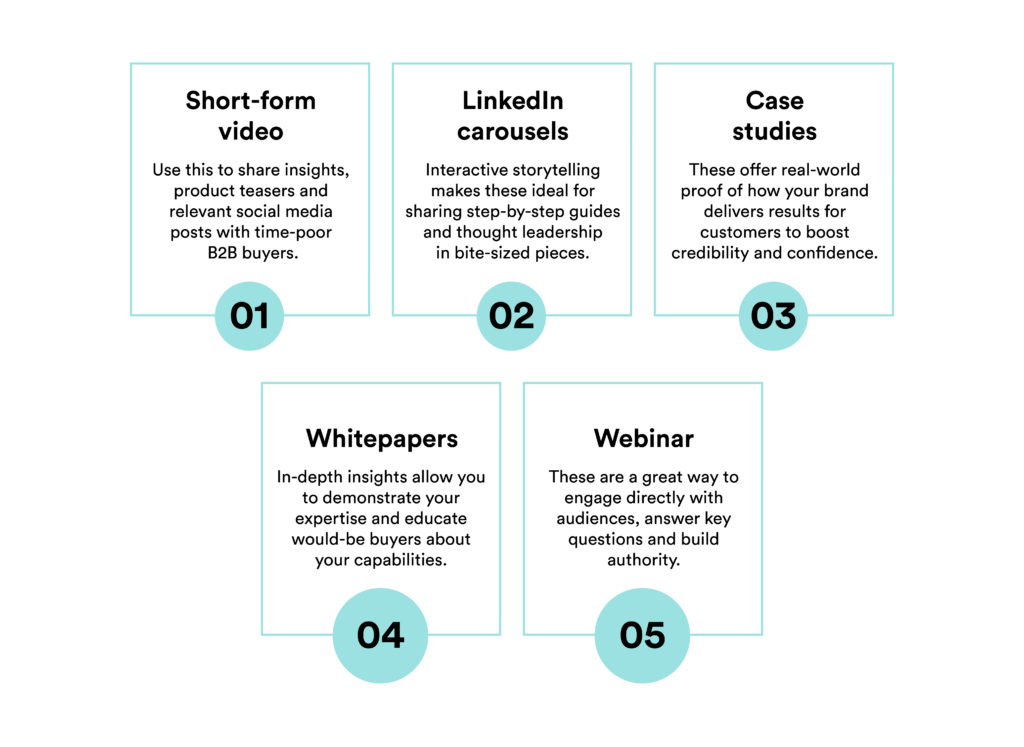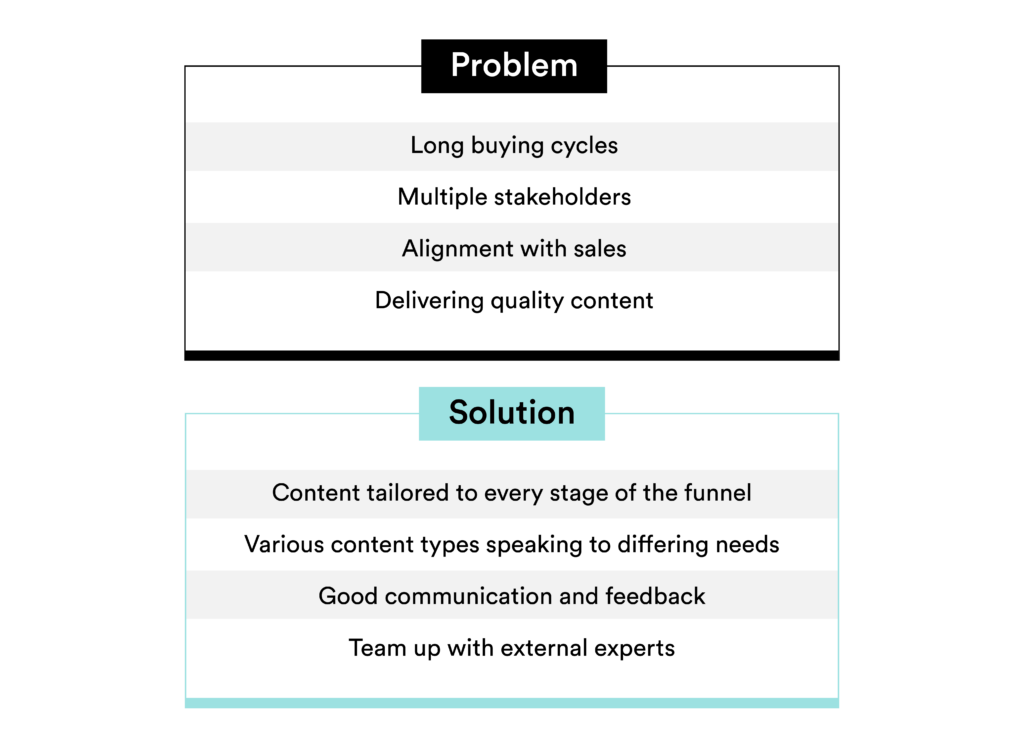
B2B content marketing guide for 2025: Trends and strategy
Summary
Discover the key B2B content marketing trends for 2025, from AI and interactive formats to data-driven strategies. Learn how to engage modern buyers, align with sales, and boost ROI with targeted, high-impact content that converts at every stage of the funnel.
- Why B2B content marketing still works
- How does B2B content marketing differ from B2C?
- What’s new in 2025: Top trends shaping B2B content
- Building a B2B content strategy that converts
- Winning content formats in B2B for 2025
- Focusing on delivery: Content promotion strategies that work
- How to measure B2B content marketing success
- Common challenges and how to overcome them
- Making B2B content marketing work in 2025
The content marketing landscape has been shifting rapidly over the last 12 months or so and B2B marketers in particular will need to adapt their strategies accordingly. Developments such as the rise of AI, a move towards data-driven marketing and the need to do more with less all put pressure on these professionals.
However, effective content marketing remains a critical part of any B2B firm’s strategy. In this guide, we’ll outline the key trends you need to be aware of to be successful in 2025 and some essential strategies for crafting a content plan that delivers results.
Why B2B content marketing still works
It’s clear that businesses widely recognise the potential of content marketing. In fact, according to the Content Marketing Institute, 46 per cent of professionals expect to see an increase in their budgets this year, with just eight per cent bracing for a fall in expenditure. The most common targets for investment include video (61 per cent), thought leadership content (52 per cent), AI for content optimisation (40 per cent) and paid advertising (also 40 per cent).

B2B content marketing remains indispensable in 2025 as it supports trust-building at every touchpoint. However, the way it is being used is evolving fast. Unlike in previous years, where different content types were used in isolation and blogs dominated, today’s strategies now blend interactive experiences, video, AI-driven personalisation and conversational content.
The rise of account-based marketing (ABM) means content is more targeted than ever, driving higher ROI and tighter alignment with sales teams. When taken in combination, these developments have allowed B2B content marketing to go beyond telling stories to
facilitating conversations, where the goal is increased engagement at every stage in order to drive audiences down the funnel towards final conversion.
How does B2B content marketing differ from B2C?
B2B content marketing is fundamentally different from B2C because it targets audiences with longer buying cycles and more complex decision-making processes. Unlike B2C, where consumers often make purchase decisions independently and emotionally, B2B buying decisions typically involve multiple stakeholders.
This requires a more rational and consultative approach that explains how products or services solve users’ problems and emphasises areas such as ROI. This means B2B content must work harder to build trust and establish authority in the industry.
B2B buyers seek content that provides real value, such as whitepapers, in-depth case studies, thought leadership articles, webinars and product demos. These formats help buyers understand how a solution fits into their business objectives, aligns with ROI goals and addresses pain points across their organisation.
By contrast, B2C content marketing often leans on short, punchy messages designed to trigger immediate emotional responses, such as limited-time offers, lifestyle imagery or viral social media posts. B2B content is more educational and informative, focusing on nurturing leads through the funnel rather than pushing for quick sales.
Additionally, B2B content marketing often involves tighter alignment with sales teams to support ABM strategies. By addressing specific challenges faced by targeted accounts and offering tailored solutions, B2B marketers can build trust and credibility. These are critical factors in winning over today’s informed, cautious buyers.
What’s new in 2025: Top trends shaping B2B content
The B2B content marketing landscape is shifting faster than ever in 2025. New technologies, evolving buyer preferences and the need for authentic engagement are driving significant change. To keep pace, marketers must adapt to new formats and strategies that resonate with today’s business buyers. Here are five key trends reshaping B2B content marketing this year:
- AI-powered content creation and personalisation: AI has moved from a ‘nice-to-have’ to an essential tool for every business. Indeed, our recent Future of Marketing survey found 91 per cent of professionals expect to integrate this in their operations. Sophisticated AI tools now assist marketers in producing high-quality content at scale while delivering personalised experiences. From drafting blog posts and automating emails to dynamic web content that adapts to user intent, AI helps marketers meet the demands of time-pressed buyers, ensuring relevance and engagement.
- Interactive formats: Today’s buyers expect engagement over passive consumption. Options such as quizzes, ROI calculators and self-assessment tools are gaining traction because they offer value through participation, providing practical insights that help buyers make informed decisions. These drive higher engagement rates and capture valuable first-party data for marketers.
- Dark social and private content sharing: Buyers are increasingly sharing content in private channels like Slack, WhatsApp and email rather than on their public social feeds. This trend can make it harder for marketers to track engagement effectively but it also highlights the importance of creating content that’s easy to share in smaller circles, fostering word-of-mouth credibility.
- Niche thought leadership content: With traditional channels saturated, alternative options such as podcasts and curated newsletters are surging as powerful tools for thought leadership. They offer a direct line to engaged audiences, help build community and position brands as trusted experts. For B2B marketers, this means investing in authentic voices and delivering consistent, high-value insights.
- Data-driven marketing and optimisation: Proving content ROI is paramount in today’s environment. This means advanced analytics tools that can be used to directly inform future campaigns. Accordion to HubSport, 30.55 percent of marketers agree data helps determine their most effective strategies, while a similar number (29.59 percent) said it improves ROI. Smart tools can track deeper engagement metrics, like time spent, shares and influence on pipeline, enabling marketers to refine strategies and justify investments with hard data, aligning marketing efforts with sales objectives and business outcomes.

Building a B2B content strategy that converts
Crafting a B2B content strategy that delivers real results requires more than great ideas. It demands a clear structure and understanding of who your audiences are and what they expect at each stage of the customer journey. Follow these key steps to put in place the essential building blocks you need to achieve this.
- Set clear goals early: Define exactly what you want your content to achieve and identify the most relevant KPIs you’ll use to measure success: Will it be increased lead quality, higher conversion rates or stronger brand authority, for example? Clear objectives help prioritise efforts and measure success effectively.
- Map content to the buyer’s journey: Align your content with each stage of the sales funnel, from awareness to consideration to decision-making. For instance, at the top of the funnel, social posting can attract attention and blogs educate. Further down, middle-funnel webinars build trust, while at the bottom of the funnel, case studies or demos drive conversions.
- Use real-world data to build audience personas: Leverage data from your CRM, website analytics and social listening tools to build detailed, realistic buyer personas. Understand their pain points, content preferences and decision-making triggers to craft more relevant messaging.
- Conduct a content audit: Review existing content to spot both gaps and opportunities. Identify high-performing pieces to repurpose or update and highlight any types of content you currently lack. This ensures your efforts remain focused and your content library aligns with your strategy.
Winning content formats in B2B for 2025
In 2025, B2B marketers must embrace a dynamic mix of content formats to capture attention, build trust and drive conversions. By leveraging these formats as part of a comprehensive strategy, B2B marketers can meet buyers on their preferred channels and deliver content that engages and converts at every stage.
- Short-form video: Quick, punchy videos – typically under two minutes – grab attention and simplify complex topics. They’re perfect for sharing insights, product teasers and relevant social media posts that align with busy B2B buyers’ schedules.
- LinkedIn carousels: Multi-slide posts on LinkedIn offer bite-sized insights and interactive storytelling, making them ideal for sharing frameworks, step-by-step guides and thought leadership in a scroll-friendly format.
- Case studies: Nothing builds trust like real-world proof. Case studies highlight your successes, show how you solve problems and demonstrate ROI, helping buyers understand what they can expect when working with you.
- Whitepapers: In-depth and data-driven, whitepapers remain essential for educating decision-makers on complex topics, showcasing expertise and supporting the early stages of the buyer journey.
- Webinars and masterclasses: Live or on-demand, webinars and masterclasses provide opportunities for education, thought leadership and real-time engagement. They help answer questions about your brand, explain how to address common pain points and showcase your industry expertise. This drives quality leads and builds brand authority.
- User-generated content: This type of content isn’t just for B2C brands. Customer success videos, testimonials and engagement with social media posts lend authenticity to your brand. They’re especially effective in a world where peer recommendations carry significant weight.

Focusing on delivery: Content promotion strategies that work
The best, most engaging content in the world won’t deliver results if your target audiences can’t see it, which is why a clear strategy for distribution is also a key element of a B2B content marketing plan.
This should focus on a mix of paid and organic channels. Start by identifying where your audiences are and tailor your messaging accordingly. While business-focused channels like LinkedIn are a good starting point, partner newsletters, syndicated content, retargeting and collaborations with industry influences can all have a role to play.
SEO is also important at this stage. This remains a key part of any B2B marketing strategy, but traditional methods will have to adapt in order to respond to the evolving way in which buyers search for information. While techniques such as using longtail keywords to answer key questions are still valid, you also need to think about tailoring your content for zero-click search and AI.
Optimising for featured snippets is essential, for example, while you also need to factor in new ways of finding information. According to TrustRadius, almost three-quarters of B2B buyers (72 per cent) now report seeing Google’s Gemini AI overviews in search, while seven per cent use large language models like ChatGPT as part of their buying process.
Having your brand appear in these results can help boost visibility and establish your firm as a leading authority in the industry. They can also offer an additional source of traffic, as 90 per cent of buyers click through to sources featured in AI overviews.
How to measure B2B content marketing success
A solid measurement framework is also essential for any B2B content marketing strategy. Good reporting and analytics not only help you understand what’s working but also inform future decisions on budget, resources and tactics. Without reliable data, it’s easy to fall into guesswork or chase tactics that deliver little ROI.
To do this effectively, it’s vital to focus on the right data and go beyond surface-level vanity metrics like page views or social likes. Instead, evaluate metrics that reveal true business impact, such as lead quality, conversion rates, sales pipeline contribution and customer retention.
Assessing the quality of leads generated by content, for example, helps ensure your marketing efforts are aligned with revenue goals rather than just building traffic. Identifying the most relevant KPIs to track keeps your reporting focused and meaningful. KPIs to consider include cost per lead, content engagement rates and influence on sales.
There are several tools that can help with this. Google Analytics 4, HubSpot and Salesforce offer detailed insights into user behaviour, conversion funnels and lead attribution. Meanwhile, platforms like Semrush and Moz help monitor SEO performance, while social media analytics tools provide engagement insights. Together, these give marketers a comprehensive view of how content efforts drive results, as well as where to improve.
Common challenges and how to overcome them
B2B content marketers face a unique set of challenges that can make or break their strategies. Understanding these issues and knowing how to tackle them keeps your campaigns on track and improves the chances of success in the long term.

- Long buying cycles: B2B buyers often take months (or even longer) to make a purchase decision. This can make it difficult to maintain engagement throughout the journey. Overcome this by mapping content to each stage of the funnel – from awareness and consideration through to decision-making – and using nurturing sequences like email drip campaigns and retargeting to maintain momentum.
- Handling multiple stakeholders: Unlike B2C, B2B decisions typically involve several people, each with different needs. To manage this, create content that speaks to diverse roles (e.g. technical, financial and operational decision-makers) and ensure key messages align with each group’s priorities.
- Aligning with sales: Marketing and sales must work hand-in-hand. Regularly collaborate with sales teams to ensure content supports their goals, provides answers to common objections and fits seamlessly into their outreach efforts. Strong communication and frequent, two-way feedback sessions are essential.
- Producing frequent, quality content with small teams: Limited resources can hinder your ability to produce consistent, high-quality content. Use content repurposing to stretch your efforts – for example, by turning webinars into blog posts, transforming case studies into infographics, or sharing snippets on social media. Consider outsourcing key tasks like design or video editing to specialist B2B content marketing agencies to free up your core team for strategic work.
Making B2B content marketing work in 2025
B2B content marketing in 2025 requires a holistic approach. Content creation teams, strategy specialists and data analysts all have a role to play in developing a successful campaign.
In order to deliver the best results, firms must also be prepared to experiment and diversify their activities to keep up with evolving trends and customer expectations. In a fast-changing world, simply sticking to the same content types and publishing schedules as in the past won’t be enough to stand out from more agile and adventurous competitors.
Rob Furness, Axonn’s head of client relations, observed: “B2B marketing teams face ongoing pressure to drive revenue, often with limited internal resources. This is especially challenging at the moment as the digital landscape is evolving faster than ever, leaving marketing teams with knowledge and experience gaps.”
Most teams won’t have all the capabilities to do this in-house. Therefore, knowing where your primary skills lie and when you’ll need to bring in expert help is equally as important as understanding your goals and how you’ll measure success.
Rob said: “B2B businesses that partner with experts who truly understand their needs and proactively adapt strategies will be better positioned to succeed.”
Want to know more about how to craft an effective B2B content marketing campaign for 2025? Get in touch with our team today.
